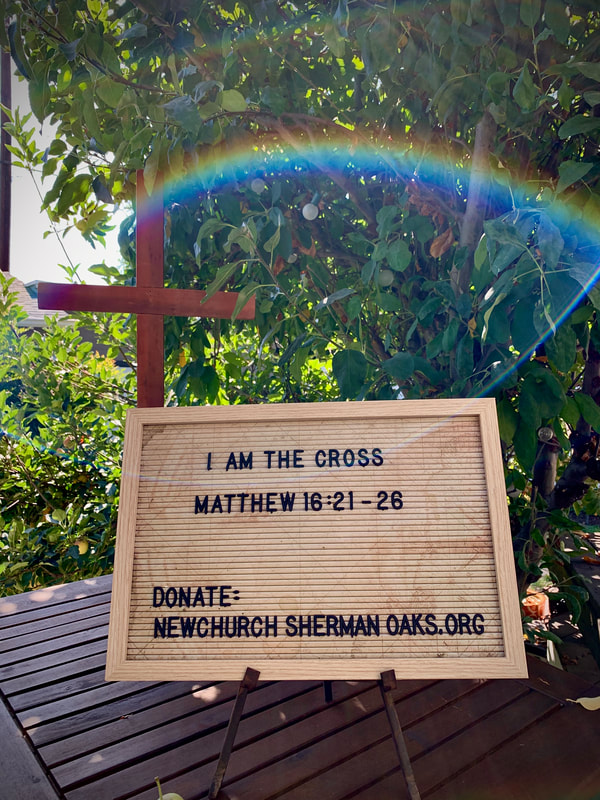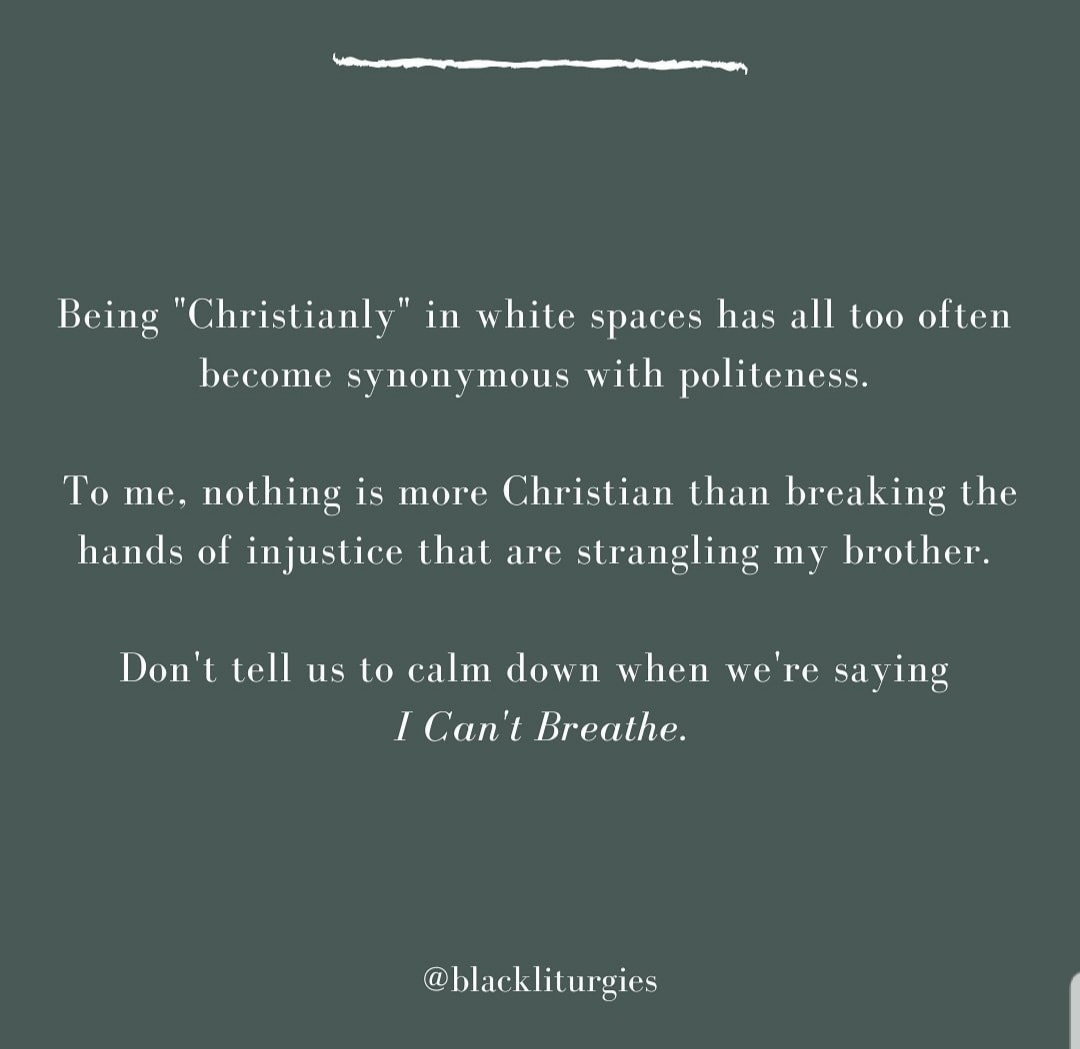Love is the ultimate cross we have to bear. And it is the ultimate sacrifice we can make for, and with, and towards one another.
Like Eugene Peterson said, “We want to follow Jesus, but like Peter we also want to tell Jesus where to go. Jesus doesn’t need our advice; he needs our faithful obedience.”
We’d do better by listening to Christ then trying to get him to listen to us. As so many of my atheist friends like to point out, too many Christians talk the talk, but only a few are willing to walk the walk. Which is why I want to point back to how Matthew began this portion of scripture. “From that time on Jesus began to show his disciples...” what it means to follow him. Jesus revealed his true self. Not with a Masterclass or PowerPoint presentation, but by being the living embodiment of the gospel. Jesus led by example; healing the sick, feeding the hungry, showing compassion, and yes, he even confronted in angry protest the unjust practices that had infected Temple life. But more importantly he showed them how to sacrifice one’s life for the sake of gaining an abundant and authentic life.
watch the message here
With a quick word search you’ll see that sacrifice is both a noun and a verb. It is the object being offered ... as well as the act of offering. LeBron James and his teammates were willing to surrender a championship and forego the prestige it would bring them. And for what purpose? Justice? Equality? Some people have ridiculed them for this. Even going so far to tell them to “Shut up and play.”
But their willingness to give up all that they had worked a lifetime to achieve reminds us of what Jesus was showing his own team. Real change begins with making hard sacrifices. Perhaps that’s why people resist change. It’s hard, painful and scary. But if you want to claim Christ’s name you got to play his game. Following him means denying yourself and taking up your cross. That is to say, to be willing to walk away from your own self-centered ambitions, goals, and choices, to walk the way of Christ – no matter the cost. As Henri Nouwen pointed out Jesus isn’t telling us to make or find a cross. He’s telling us take up the cross we already have. Yours might be a handicap or disability; chronic pain or depression; conflict in your family or at work. For too many Americans, the cross is being a victim of violence because of the color of their skin or the person they love. We don’t choose these crosses, but they’re ours to carry. We can ignore them, reject them, refuse them, and even hate them. Or we can lift them up and follow Jesus who gives our suffering new life and new purpose. After all, “What will it profit you to gain the world but lose your soul?” Jesus wants us to experience a rich and deeply authentic life; a life where one bears one’s cross, and all the suffering that might entail. Like Paul noted, “this message of the Cross seems like sheer madness. But to us who are being saved we know it is the power of God” (c.f. 1 Corinthians 1:18). And like Jesus showed us, the power of God is love. His cross is our reminder of what God was willing to sacrifice to love us. The power of God’s love gives our pain and suffering purpose. For example, those who have suffered deeply are better able to understand the power of compassion. And are better able to put themselves on the line to bear one another’s burdens. Just look at the kids who survived a school shooting. They are better able to speak to and for those who have lost loved ones to gun violence. They are more willing to stand up against powerful lobbyists to demand real reforms that will enable us all to live in peace. LeBron James, Kwai Lenard, Anthony Davis, Paul George, they know what racial injustice feels like. That is why they are willing to make the sacrifice. Jesus shows us that our sacrifice and suffering are critical parts of who we are, they are the keys to unlocking our real self and our true faith. They require us to put real trust in a God who paradoxically overcomes death with life. Like the disciples will come to learn, faithfulness is a daily sacrifice we all must make – a constant dying and resurrecting; always shedding the old as we step into the new. Giving up ourselves, our comforts and wants, might seem foolish or hard at first. But in and by our faith, the Bible assures us that we’re given the power of the Holy Spirit, the same power given to Jesus, to do the will of God. By our faith, we realize that we have the power to love as God loves us. What then are you willing to give up so that you can live faithfully and fully in God’s love for you? Jesus tells his followers that whatever you lose will pale in comparison to what you will gain: a foretaste of heaven, here and now. I know a lot of people who cling to Christ, not because they want to do what he asks but because they want to get into heaven. But here’s the way I see it. I don’t think the disciples followed Jesus because they were looking a free pass to heaven after death. I think they picked up their cross and followed him because they watched him, and saw who he was, and realized heaven had come to them. And they wanted to be a part of it. God didn’t become incarnate to us to prepare us for death. God came, in real human flesh, to give us an abundant life. To quote Shane Claiborne, “What good would Jesus’ wisdom be if it were meant only for the afterlife? How hard could it be to love our enemies in heaven?” “Our faith must be alive,” wrote Thich Nhat Hanh. “It implies practice, living our daily life in mindfulness. Praying not just with hearts and minds, with our actions in the world.” Again, Jesus showed his disciples how to do this. He walked the walk, and talked the talk. And expects us to do the same. If we dare to follow Christ, then our actions must be modeled after him. If we live and love as Jesus did, then our actions will be pure and purposeful, and we will do our share to help create a more peaceful world for all of God’s children. This is what it means to be the church – to be the very incarnation of God’s love in the world. Love is the ultimate cross we have to bear. And it is the ultimate sacrifice we can make for, and with, and towards one another. Jesus shows us the way. He is the good shepherd who leads his sheep and cares for them, tending to their wounds, protecting them from danger, and is even willing to lay down his life for them. If we claim his name, then we too have to be willing to bleed, weep, sweat, and die for him. The world might see this as folly and foolishness. That anyone who is looking to save their life must lose it. But Jesus both showed us and told us that this is it the end of the story. The cross of Christ is empty. His tomb is empty. Out of the worst suffering, out of the apparent meaninglessness of death and defeat, God is able to bring new life. What God accomplished in Christ, God is able to accomplish in you and me. This might mean walking out of a game in protest of racial inequality. This might mean getting involved in a cause that might cause you to lose some friends, or even your job.
Work Cited: Bartlett, David L. and Barbara Brown Taylor, eds. Feasting on the Word, Year A Vol. 4. Louisville: Westminster John Knox, 2011. Claiborne, Shane. The Irresistible Revolution: Living As An Ordinary Radical. Grand Rapids: Zondervan, 2006. Hahn, Thich Nhat. Living Buddah, Living Christ. New York: Riverhead, 1995. Nouwen, Henri. Bread For the Journey: A Daybook of Wisdom and Faith. New York: HarperCollins, 1997. Peterson, Eugene. A Year With Jesus: Daily Readings and Meditations. San Francisco: Harper Collins, 2006.
0 Comments
Leave a Reply. |
Ian MacdonaldAn ex-copywriter turned punk rock pastor and peacemaker who dedicates his life to making the world a better place for all humanity. "that they all might be one" ~John 17:21“Prius vita quam doctrina.”
~ St. Thomas Aquinas (1225–1274) * “Life is more important than doctrine.”
Archives
June 2024
|

